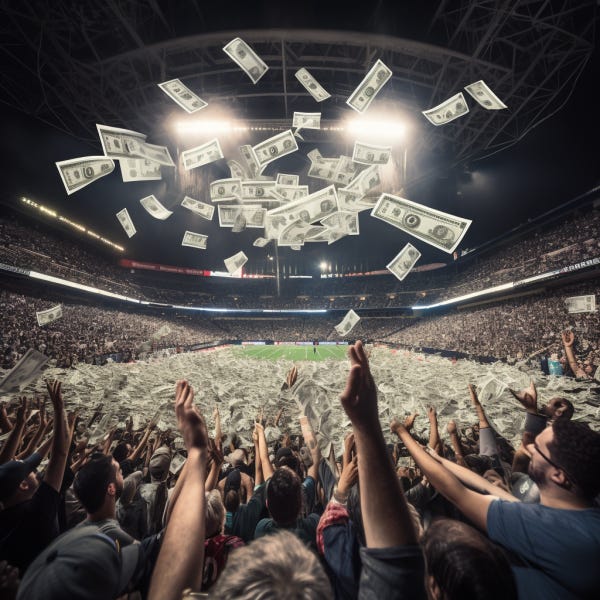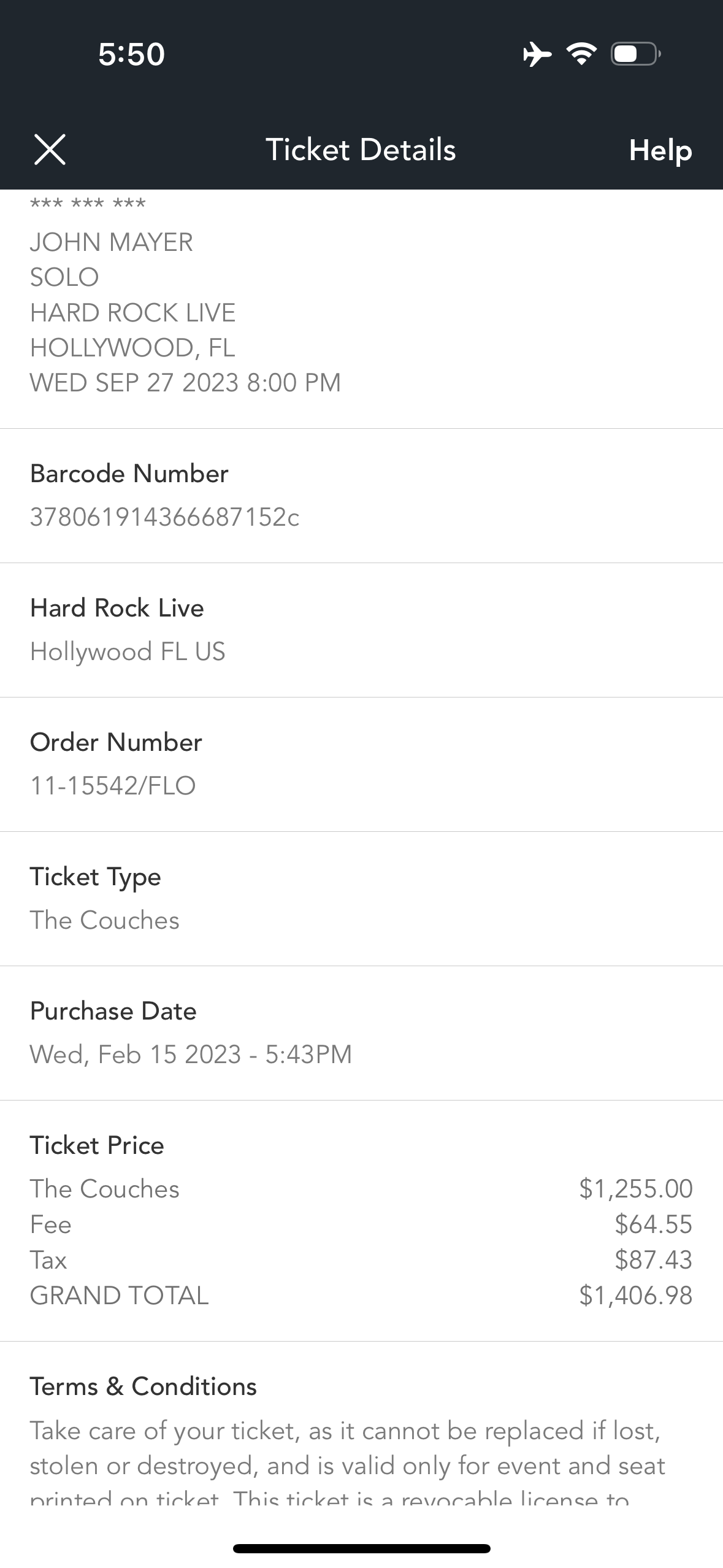Welcome back readers to October and the start of 4Q23 the final quarter of the year and the most important quarter in my new favorite sport Football!
The last three months of the year kick off the holiday season - spooky season, which officially begins when you first watch Hocus Pocus and ends when the Spirit Halloweens vanish.
This month’s edition of Ratlinks concerns:
Literal Literism
Concerts: extremely expensive experiences
I’m writing you to catch you up on places I've been
Ratlinks began as a way to recap my life progressing into coverage of myriad topics like how my family was unable to go apple-picking because of Steve Bannon’s arrest
Last month Ratlinks explored America’s national parks: Yosemite and Grand Teton. Embarking on an exploration of national parks usually involves lengthy drives through the untouched wilderness of states like Montana, Wyoming, and Idaho. These scenic routes, although captivating, often run through isolated regions with patchy access to radio or streaming services. I prepared my kids with plenty of options but it appeared I had only downloaded, Rick Rubin’s podcast Tetragrammaton episode where he interviews John Mayer. This two-hour wide-ranging conversation is quite compelling, touching on John’s start as an artist, family life as well as the songwriting process and the broader concept of ideation.
Rick Rubin: And something that John Lennon talked about is as soon as you have the beginning of a song, even if it's just a rough draft, write it til the end. Don't let that moment pass, because you will never come back to it.
So again I don't know if you have to refine it, but you have to really get as close as you can to a great first draft, where then maybe it's like, oh I'll change this word. Maybe this line is not as good as it could be, but get to where you're like, I see this whole song.
John Mayer: I couldn't agree more. Just get a circuit going. Get the light bulb to light up cause all the wiring is in there. And then it's so much easier to change it, and then you realize most of it didn't need to be changed.
Write to the end, even if it’s just a rough draft, to preserve the initial spark and momentum.
Advice that applies across multiple disciplines.
There is almost certainly a constructed schism between (a) how I feel, and (b) how I think I feel. There’s probably a third level, too — how I want to think I feel. Very often, I don’t know what I think about something until I start writing about it.
Just as important as crafting the work is determining a point where one must decide if this is something to be shared or abandoned.
With the will to work hard, and a library card
A thought experiment is a hypothetical situation that we create in our minds to help us think through a concept or a problem. It involves imagining an event or a series of events and considering how those events might affect our understanding of a particular issue.
If 2pac was still alive, do you think he would accept being appointed to occupy Senator Diane Feinstein’s now vacant seat?
In pop culture economics, thought experiments can help uncover blindspots that might involve understanding unmet audience needs, identifying new demographics, uncovering mediums not being effectively utilized, or creating innovative marketing strategies. For example:
How do you make the most popular sport in America more popular?
Have the most popular recording artist with an incredibly rabid fan base date a football player, opening the sport to an entirely new female demographic.
slow dancing in a burning room
Life often feels like a search for "symbolism." Interpreting meaning in a figurative, metaphorical, allegorical, or symbolic sense, adds layers of complexity and depth beyond the literal words or images.
The opposite of symbolism is literalism - sticking to the original, explicit meaning of words, phrases, or texts.
Literal literalism is an idea presented by philosopher Slavoj Žižek, that challenges the traditional definition of literalism.
In order to understand the "literal truth," we must look beyond the explicit, factual meaning and engage with the implicit, unnoticed dimensions of a statement or event. This suggests letting go of the established connotations and embracing the overlooked or unexpected implications that arise.
In essence, literal literalism speaks about paying attention to the "more literal than literal" meaning of things, not just the explicit content but also the broader societal, cultural, and ideological context surrounding it.
What on earth does that mean?
By searching for and then deeply exploring blindspots we are often able to uncover potential new understandings and opportunities.
Take a break from thinking about the Roman Empire and instead think about the movie Titanic. You know the story of the sinking of an unsinkable ship that was also one of the highest-grossing movies of all time and Slavoj Zizek’s favorite example to explain literal literalism.
"How is the catastrophe connected to the couple, the rich upper-class girl and the poor lower-class boy? At what exact moment does the iceberg hit the ship? After making love, they go up on the deck and embrace again and then she tells him: 'I will stay with you and abandon my people.'
At that moment the iceberg hits the ship.
What's the point? I claim the true catastrophe would have been for them really to stay together because it wouldn't work and they would split. To save that impossible dream the ship must sink.
TICKETS PLEASE
Last month, John Mayer the above-mentioned mid-tempo sob rocker performed a two-night stand at the Hard Rock Casino in Miami.
Seeing Dead & Company over the summer made the thought of a John Mayer solo show intriguing. After listening to a two-plus hour podcast with Rick Rubin and John Mayer, I was more convinced that I should check out the show.
A major roadblock emerged in the form of steep ticket prices which initially marred my anticipation with a sense of apprehension. Luckily the ticket market is easy to track and as the date of the concert neared a trend of declining prices began to emerge.
Concerts serve as intriguing cases for market study. The supply, in this context, is fixed by the number of seats that the venue can accommodate - a definite, unalterable number. The floor price, or the minimum acceptable price, rests on the decisions of the venue organizers and promoters but is underpinned by one of if not the most important concepts in economics the law of supply and demand.
LOOKING FOR ONE
On the day of the show, I called the box office and was informed that a block of tickets in the very first rows was still available. To make the offer more enticing if I purchased tickets at the box office I would avoid many of the additional fees incurred when buying online.
Venues earn money from promoters to put on the concerts while promoters are paid through ticket sales. Additional fees may pile on, as well, including service fees, processing fees, delivery fees, and facility charges which can show up when you're set to purchase your tickets, per the Los Angeles Times.
Worse you are often levied fees more than once if you re-sell your ticket. Fans pay fees to acquire a ticket and then pay a new fee upon resale of the same ticket. The buyer of the resold ticket also pays fees.
Ample high-quality supply alleviated the major risk of not acquiring a ticket and allowed for a different variable, cost, to be optimized. In doing so opened the door to less traditional channels like Reddit in order to directly negotiate with potential sellers. Direct negotiations allow for far more leeway in price by removing middlemen and their additional layer of fees. It also introduces market participants who are more likely less price disciplined and could be forced sellers looking to recoup some or all of a wasting asset. These unverified introduce a host of other risks with the biggest being scams and potentially counterfeit tickets. Nevertheless, the thrill of the chase, the potential for a better deal, and the promise of live music kept pushing me forward in this intriguing game of supply, demand, and negotiation.
In my search for tickets, I found a few tickets with a face value of $120 that were listed at $60. The roughly 50% discount to face seemed like a great deal. However, upon checkout, I discovered that for the right to facilitate this transaction, SeatGeek was levying almost $50 in fees or 83% of the total ticket cost.
If purchased the new buyer would pay $50 in fees, the seller of the ticket would pay 10% of the ticket sale, $6 in this case. That is on top of the likely $50 in fees charged when the ticket was originally purchased. A ticket selling for $60 a 50% discount to the list price generates at least $106 in fees.1
Fans, artists, and the government are all not happy. It seems ticket fees being too high is one issue America can agree on.2
The Cure, known for hits such as Friday I’m in Love and Just Like Heaven, tried to avoid ticket scalping by selling seats for as little as $20 and limiting sales to verified fans. After tickets for the US tour went on sale Wednesday, some fans reported paying more in fees than for their seats.
Robert Smith the lead singer was not having it:
“I AM AS SICKENED AS YOU ALL ARE BY TODAY’S TICKETMASTER ‘FEES’ DEBACLE,” Smith raged in his latest all-caps broadside against Ticketmaster. “TO BE VERY CLEAR: THE ARTIST HAS NO WAY TO LIMIT THEM. I HAVE BEEN ASKING HOW THEY ARE JUSTIFIED. IF I GET ANYTHING COHERENT BY WAY OF AN ANSWER I WILL LET YOU ALL KNOW.”
Who says I can't get stoned / Plan a trip to Japan alone
THOUGHT EXPERIMENT: What would it be like to go to see a band with a complete stranger?
In the end, I connected with a gentleman named Osaid who was flying in for the show from Chicago. Osaid planned to attend with his wife who unfortunately had a last-minute conflict. It is worth noting that is often harder to sell one seat than it is to move a pair.
At first, Osaid was asking to recoup his extremely high-cost basis for his more luxurious seat but quickly relented after I reminded him that his cost basis was a sunk cost3 and that I could still purchase potentially better seats from the box office.
Osaid relented, deciding it was better to recoup some money than no money at all. In addition, even if he sold tickets to me at what appeared to be a lower price, it is possible he would make more money than he would if he sold the tickets at a higher price on StubHub. As in our transaction, both parties avoid paying another layer of fees.
I arrived at the concert and met up with a friend and his group of friends in the lobby. I explained that I purchased a ticket two hours ago from a random stranger and I needed to go inside and meet him.
You are going on a date with someone you don’t know and your wife is cool with this?
In the middle of the first song, my new friend arrived with four drinks and politely offered me one. As the concert came to a close we walked out together and ran into the same group from before the concert and as I introduced them to Osaid they just shook their head and laughed as my earlier story came full circle and the character went from figurative to literal.
Tickets are so expensive, because of fees and the depth of the resale market. For further reading check out the LA Times article explaining the complicated world of ticketing
Washington is stepping in with both the President and Congress demanding action. Many online ticket sellers impose massive service fees at check-out that are not disclosed when consumers are choosing their tickets. In a review of 31 different sporting events across five ticket sellers’ websites, service charges averaged more than 20% of the ticket’s face value, and total fees—like processing fees, delivery fees, and facility fees—reached up to more than half the cost of the ticket itself. A family of four attending a show could end up paying far more than $100 in fees above and beyond the cost of the tickets.
While antitrust enforcement agencies have the authority to investigate and address anti-competitive conduct in the industry, the President urges Congress to act now to reduce these fees through legislation. Specifically, the President is calling on Congress to prohibit excessive fees, require the fees to be disclosed in the ticket price, and mandate disclosure of any ticket holdbacks that diminish available supply.
Sunk costs are typically not relevant when making decisions about the future and should not influence your choices. Instead, rational decision-making should focus on the prospective costs and benefits that can be influenced by your current or future decisions. The "sunk cost fallacy," causes individuals to make incorrect decisions based on the desire to justify or "get their money's worth" from past investments, even when it's not economically rational to do so.









